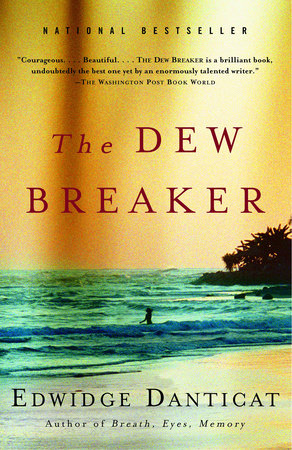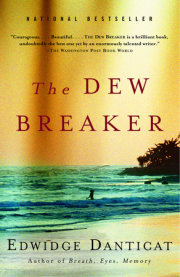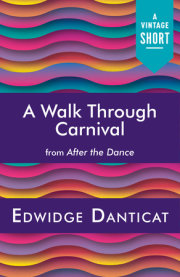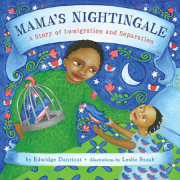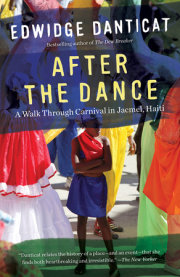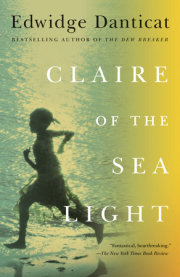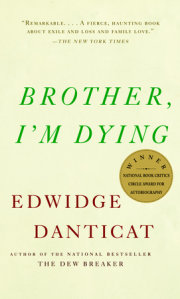The Book of the Dead My father is gone. I’m slouched in a cast-aluminum chair across from two men, one the manager of the hotel where we’re staying and the other a policeman. They’re both waiting for me to explain what’s become of him, my father.
The hotel manager—mr. flavio salinas, the plaque on his office door reads—has the most striking pair of chartreuse eyes I’ve ever seen on a man with an island Spanish lilt to his voice.
The police officer, Officer Bo, is a baby-faced, short, white Floridian with a potbelly.
“Where are you and your daddy from, Ms. Bienaimé?” Officer Bo asks, doing the best he can with my last name. He does such a lousy job that, even though he and I and Salinas are the only people in Salinas’ office, at first I think he’s talking to someone else.
I was born and raised in East Flatbush, Brooklyn, and have never even been to my parents’ birthplace. Still, I answer “Haiti” because it is one more thing I’ve always longed to have in common with my parents.
Officer Bo plows forward with, “You all the way down here in Lakeland from Haiti?”
“We live in New York,” I say. “We were on our way to Tampa.”
“To do what?” Officer Bo continues. “Visit?”
“To deliver a sculpture,” I say. “I’m an artist, a sculptor.”
I’m really not an artist, not in the way I’d like to be. I’m more of an obsessive wood-carver with a single subject thus far—my father.
My creative eye finds Manager Salinas’ office gaudy. The walls are covered with orange-and-green wallpaper, briefly interrupted by a giant gold leaf–bordered print of a Victorian cottage that resembles the building we’re in.
Patting his light green tie, which brings out even more the hallucinatory shade of his eyes, Manager Salinas reassuringly tells me, “Officer Bo and I will do our best.”
We start out with a brief description of my father: “Sixty-five, five feet eight inches, one hundred and eighty pounds, with a widow’s peak, thinning salt-and-pepper hair, and velvet-brown eyes—”
“Velvet?” Officer Bo interrupts.
“Deep brown, same color as his complexion,” I explain.
My father has had partial frontal dentures since he fell off his and my mother’s bed and landed on his face ten years ago when he was having one of his prison nightmares. I mention that too. Just the dentures, not the nightmares. I also bring up the blunt, ropelike scar that runs from my father’s right cheek down to the corner of his mouth, the only visible reminder of the year he spent in prison in Haiti.
“Please don’t be offended by what I’m about to ask,” Officer Bo says. “I deal with an older population here, and this is something that comes up a lot when they go missing. Does your daddy have any kind of mental illness, senility?”
I reply, “No, he’s not senile.”
“You have any pictures of your daddy?” Officer Bo asks.
My father has never liked having his picture taken. We have only a few of him at home, some awkward shots at my different school graduations, with him standing between my mother and me, his hand covering his scar. I had hoped to take some pictures of him on this trip, but he hadn’t let me. At one of the rest stops I bought a disposable camera and pointed it at him anyway. As usual, he protested, covering his face with both hands like a little boy protecting his cheeks from a slap. He didn’t want any more pictures taken of him for the rest of his life, he said, he was feeling too ugly.
“That’s too bad,” Officer Bo offers at the end of my too lengthy explanation. “He speaks English, your daddy? Can he ask for directions, et cetera?”
“Yes,” I say.
“Is there anything that might make your father run away from you, particularly here in Lakeland?” Manager Salinas asks. “Did you two have a fight?”
I had never tried to tell my father’s story in words before now, but my first completed sculpture of him was the reason for our trip: a three-foot mahogany figure of my father naked, kneeling on a half-foot-square base, his back arched like the curve of a crescent moon, his downcast eyes fixed on his very long fingers and the large palms of his hands. It was hardly revolutionary, rough and not too detailed, minimalist at best, but it was my favorite of all my attempted representations of my father. It was the way I had imagined him in prison.
The last time I had seen my father? The previous night, before falling asleep. When we pulled our rental car into the hotel’s hedge-bordered parking lot, it was almost midnight. All the restaurants in the area were closed. There was nothing to do but shower and go to bed.
“It’s like paradise here,” my father had said when he’d seen our tiny room. It had the same orange-and-green wallpaper as Salinas’ office, and the plush emerald carpet matched the walls. “Look, Ka,” he said, his deep, raspy voice muted with exhaustion, “the carpet is like grass under our feet.”
He’d picked the bed closest to the bathroom, removed the top of his gray jogging suit, and unpacked his toiletries. Soon after, I heard him humming loudly, as he always did, in the shower.
I checked on the sculpture, just felt it a little bit through the bubble padding and carton wrapping to make sure it was still whole. I’d used a piece of mahogany that was naturally flawed, with a few superficial cracks along what was now the back. I’d thought these cracks beautiful and had made no effort to sand or polish them away, as they seemed like the wood’s own scars, like the one my father had on his face. But I was also a little worried about the cracks. Would they seem amateurish and unintentional, like a mistake? Could the wood come apart with simple movements or with age? Would the client be satisfied?
I closed my eyes and tried to picture the client to whom I was delivering the sculpture: Gabrielle Fonteneau, a Hai- tian American woman about my age, the star of a popular television series and an avid art collector. My friend Céline Benoit, a former colleague at the junior high school where I’m a substitute art teacher, had grown up with Gabrielle Fonteneau in Tampa and on a holiday visit home had shown Gabrielle Fonteneau a snapshot of my Father piece and had persuaded her to buy it.
Gabrielle Fonteneau was spending the week away from Hollywood at her parents’ house in Tampa. I took some time off, and both my mother and I figured that my father, who watched a lot of television, both at home and at his Nostrand Avenue barbershop, would enjoy meeting Gabrielle Fonteneau too. But when I woke up, my father was gone and so was the sculpture.
I stepped out of the room and onto the balcony overlooking the parking lot. It was a hot and muggy morn- ing, the humid air laden with the smell of the freshly mowed tropical grass and sprinkler-showered hibiscus bordering the parking lot. My rental car too was gone. I hoped my father was driving around trying to find us some breakfast and would explain when he got back why he’d taken the sculpture with him, so I got dressed and waited. I watched a half hour of local morning news, smoked five mentholated cigarettes even though we were in a nonsmoking room, and waited some more.
All that waiting took two hours, and I felt guilty for having held back so long before going to the front desk to ask, “Have you seen my father?”
I feel Officer Bo’s fingers gently stroking my wrist, perhaps to tell me to stop talking. Up close Officer Bo smells like fried eggs and gasoline, like breakfast at the Amoco.
“I’ll put the word out with the other boys,” he says. “Salinas here will be in his office. Why don’t you go on back to your hotel room in case your daddy shows up there?”
Back in the room, I lie in my father’s unmade bed. The sheets smell like his cologne, an odd mix of lavender and lime that I’ve always thought too pungent, but that he likes nonetheless.
I jump up when I hear the click from the electronic key in the door. It’s the maid. She’s a young Cuban woman who is overly polite, making up for her lack of English with deferential gestures: a great big smile, a nod, even a bow as she backs out of the room. She reminds me of my mother when she has to work on non-Haitian clients at her beauty shop, how she pays much more attention to those clients, forcing herself to laugh at jokes she barely understands and smiling at insults she doesn’t quite grasp, all to avoid being forced into a conversation, knowing she couldn’t hold up her end very well.
It’s almost noon when I pick up the phone and call my mother at the salon. One of her employees tells me that she’s not yet returned from the Mass she attends every day. After the Mass, if she has clients waiting, she’ll walk the twenty blocks from the church to the salon. If she has no appointments, then she’ll let her workers handle the walk-ins and go home for lunch. This was as close to retirement as my mother would ever come. This routine was her dream when she first started the shop. She had always wanted a life with room for daily Mass and long walks and the option of sometimes not going to work.
I call my parents’ house. My mother isn’t there either, so I leave the hotel number on the machine.
“Please call as soon as you can, Manman,” I say. “It’s about Papa.”
It’s early afternoon when my mother calls back, her voice cracking with worry. I had been sitting in that tiny hotel room, eating chips and candy bars from the vending ma-chines, chain-smoking and waiting for something to happen, either for my father, Officer Bo, or Manager Salinas to walk into the room with some terrible news or for my mother or Gabrielle Fonteneau to call. I took turns imagining my mother screaming hysterically, berating both herself and me for thinking this trip with my father a good idea, then envisioning Gabrielle Fonteneau calling to say that we shouldn’t have come on the trip. It had all been a joke. She wasn’t going to buy a sculpture from me after all, especially one I didn’t have.
“Where Papa?” Just as I expected, my mother sounds as though she’s gasping for breath. I tell her to calm down, that nothing bad has happened. Papa’s okay. I’ve just lost sight of him for a little while.
“How you lost him?” she asks.
“He got up before I did and disappeared,” I say.
“How long he been gone?”
I can tell she’s pacing back and forth in the kitchen, her slippers flapping against the Mexican tiles. I can hear the faucet when she turns it on, imagine her pushing a glass underneath it and filling it up. I hear her sipping the water as I say, “He’s been gone for hours now. I don’t even believe it myself.”
“You call police?”
Now she’s probably sitting at the kitchen table, her eyes closed, her fingers sliding back and forth across her forehead. She clicks her tongue and starts humming one of those mournful songs from the Mass, songs that my father, who attends church only at Christmas, picks up from her and also hums to himself in the shower.
My mother stops humming just long enough to ask, “What the police say?”
“To wait, that he’ll come back.”
There’s a loud tapping on the line, my mother thumping her fingers against the phone’s mouthpiece; it gives me a slight ache in my ear.
“He come back,” she says with more certainty than either Officer Bo or Manager Salinas. “He not leave you like that.”
I promise to call my mother hourly with an update, but I know she’ll call me sooner than that, so I dial Gabri- elle Fonteneau’s cell phone. Gabrielle Fonteneau’s voice sounds just as it does on television, but more silken, nuanced, and seductive without the sitcom laugh track.
“To think,” my father once said while watching her show, in which she plays a smart-mouthed nurse in an inner-city hospital’s maternity ward. “A Haitian-born actress with her own American television show. We have really come far.”
“So nice of you to come all this way to personally deliver the sculpture,” Gabrielle Fonteneau says. She sounds like she’s in a place with cicadas, waterfalls, palm trees, and citronella candles to keep the mosquitoes away. I realize that I too am in such a place, but I’m not able to enjoy it.
“Were you told why I like this sculpture so much?” Gabrielle Fonteneau asks. “It’s regal and humble at the same time. It reminds me of my own father.”
I hadn’t been trying to delve into the universal world of fathers, but I’m glad my sculpture reminds Gabrielle Fonteneau of her father, for I’m not beyond the spontaneous fanaticism inspired by famous people, whose breezy declarations seem to carry so much more weight than those of ordinary mortals. I still had trouble believing I had Gabrielle Fonteneau’s cell number, which Céline Benoit had made me promise not to share with anyone else, not even my father.
My thoughts are drifting from Gabrielle Fonteneau’s father to mine when I hear her say, “So when will you get here? You have the directions, right? Maybe you can join us for lunch tomorrow, at around twelve.”
“We’ll be there,” I say.
But I’m no longer so certain.
My father loves museums. When he’s not working at his barbershop, he’s often at the Brooklyn Museum. The Ancient Egyptian rooms are his favorites.
“The Egyptians, they was like us,” he likes to say. The Egyptians worshiped their gods in many forms, fought among themselves, and were often ruled by foreigners. The pharaohs were like the dictators he had fled, and their queens were as beautiful as Gabrielle Fonteneau. But what he admires most about the Ancient Egyptians is the way they mourn their dead.
“They know how to grieve,” he’d say, marveling at the mummification process that went on for weeks but re-sulted in corpses that survived thousands of years.
My whole adult life, I have struggled to find the proper manner of sculpting my father, a quiet and distant man who only came alive while standing with me most of the Saturday mornings of my childhood, mesmerized by the golden masks, the shawabtis, and the schist tablets, Isis, Nefertiti, and Osiris, the jackal-headed ruler of the underworld.
The sun is setting and my mother has called more than a dozen times when my father finally appears in the hotel room doorway. He looks like a much younger man and appears calm and rested, as if bronzed after a long day at the beach.
“Too smoky in here,” he says.
I point to my makeshift ashtray, a Dixie cup filled with tobacco-dyed water and cigarette butts.
“Ka, let your father talk to you.” He fans the smoky air with his hands, walks over to the bed, and bends down to unlace his sneakers. “Yon ti koze, a little chat.”
“Where were you?” I feel my eyelids twitching, a nervous reaction I inherited from my epileptic mother. “Why didn’t you leave a note? And Papa, where is the sculpture?”
“That is why we must chat,” he says, pulling off his sand-filled sneakers and rubbing the soles of his large, calloused feet each in turn. “I have objections.”
He’s silent for a long time, concentrating on his foot massage, as though he’d been looking forward to it all day.
“I’d prefer you not sell that statue,” he says at last. Then he turns away, picks up the phone, and calls my mother.
“I know she called you,” he says to her in Creole. “She panicked. I was just walking, thinking.”
I hear my mother loudly scolding him, telling him not to leave me again. When he hangs up, he grabs his sneakers and puts them back on.
“Where’s the sculpture?” My eyes are twitching so badly now I can barely see.
“We go,” he says. “I take you to it.”
We walk out to the parking lot, where the hotel sprinkler is once more at work, spouting water onto the grass and hedges like centrifugal rain. The streetlights are on now, looking brighter and brighter as the dusk deepens around them. New hotel guests are arriving. Others are leaving for dinner, talking loudly as they walk to their cars.
As my father maneuvers our car out of the parking lot, I tell myself that he might be ill, mentally ill, even though I’d never detected any signs of it before, beyond his prison nightmares.
When I was eight years old and my father had the measles for the first time in his life, I overheard him say to a customer on the phone, “Maybe serious. Doctor tell me, at my age, measles can kill.”
This was the first time I realized that my father could die. I looked up the word “kill” in every dictionary and encyclopedia at school, trying to understand what it really meant, that my father could be eradicated from my life.
My father stops the car on the side of the highway near a man-made lake, one of those marvels of the modern tropical city, with curved stone benches surrounding a stagnant body of water. There’s scant light to see by except a half-moon. Stomping the well-manicured grass, my father heads toward one of the benches. I sit down next to him, letting my hands dangle between my legs.
Here I am a little girl again, on some outing with my father, like his trips to the botanic garden or the zoo or the Egyptian statues at the museum. Again, I’m there simply because he wants me to be. I knew I was supposed to learn something from these childhood outings, but it took me years to realize that ultimately my father was doing his best to be like other fathers, to share as much of himself with me as he could.
I glance over at the lake. It’s muddy and dark, and there are some very large pink fishes bobbing back and forth near the surface, looking as though they want to leap out and trade places with us.
“Is this where the sculpture is?” I ask.
“In the water,” he says.
“Okay,” I say calmly. But I know I’m already defeated. I know the piece is already lost. The cracks have probably taken in so much water that the wood has split into several chunks and plunged to the bottom. All I can think of saying is something glib, something I’m not even sure my father will understand.
“Please know this about yourself,” I say. “You’re a very harsh critic.”
My father attempts to smother a smile. He scratches his chin and the scar on the side of his face, but says nothing. In this light the usually chiseled and embossed-looking scar appears deeper than usual, yet somehow less threatening, like a dimple that’s spread out too far.
Anger is a wasted emotion, I’ve always thought. My parents would complain to each other about unjust politics in New York, but they never got angry at my grades, at all the Cs I got in everything but art classes, at my not eating my vegetables or occasionally vomiting my daily spoonful of cod-liver oil. Ordinary anger, I’ve always thought, is useless. But now I’m deeply angry. I want to hit my father, beat the craziness out of his head.
“Ka,” he says, “I tell you why I named you Ka.”
Yes, he’d told me, many, many times before. Now does not seem like a good time to remind me, but maybe he’s hoping it will calm me, keep me from hating him for the rest of my life.
“Your mother not like the name at all,” he says. “She say everybody tease you, people take pleasure repeating your name, calling you Kaka, Kaka, Kaka.”
This too I had heard before.
“Okay,” I interrupt him with a quick wave of my hands. “I’ve got it.”
“I call you Ka,” he says, “because in Egyptian world—”
A ka is a double of the body, I want to complete the sentence for him—the body’s companion through life and after life. It guides the body through the kingdom of the dead. That’s what I tell my students when I overhear them referring to me as Teacher Kaka.
“You see, ka is like soul,” my father now says. “In Haiti is what we call good angel, ti bon anj. When you born, I look at your face, I think, here is my ka, my good angel.”
I’m softening a bit. Hearing my father call me his good angel is the point at which I often stop being apathetic.
“I say rest in Creole,” he prefaces, “because my tongue too heavy in English to say things like this, especially older things.”
“Fine,” I reply defiantly in English.
“Ka,” he continues in Creole, “when I first saw your statue, I wanted to be buried with it, to take it with me into the other world.”
“Like the Ancient Egyptians,” I continue in English.
He smiles, grateful, I think, that in spite of everything, I can still appreciate his passions.
“Ka,” he says, “when I read to you, with my very bad accent, from The Book of the Dead, do you remember how I made you read some chapters to me too?”
But this recollection is harder for me to embrace. I had been terribly bored by The Book of the Dead. The images of dead hearts being placed on scales and souls traveling aimlessly down fiery underground rivers had given me my own nightmares. It had seemed selfish of him not to ask me what I wanted to listen to before going to bed, what I wanted to read and have read to me. But since he’d recovered from the measles and hadn’t died as we’d both feared, I’d vowed to myself to always tolerate, even indulge him, letting him take me places I didn’t enjoy and read me things I cared nothing about, simply to witness the joy they gave him, the kind of bliss that might keep a dying person alive. But maybe he wasn’t going to be alive for long. Maybe this is what this outing is about. Perhaps my “statue,” as he called it, is a sacrificial offering, the final one that he and I would make together before he was gone.
“Are you dying?” I ask my father. It’s the one explanation that would make what he’s done seem insignificant or even logical. “Are you ill? Are you going to die?”
What would I do now, if this were true? I’d find him the best doctor, move back home with him and my mother. I’d get a serious job, find a boyfriend, and get married, and I’d never complain again about his having dumped my sculpture in the lake.
Like me, my father tends to be silent a moment too long during an important conversation and then say too much when less should be said. I listen to the wailing of crickets and cicadas, though I can’t tell where they’re coming from. There’s the highway, and the cars racing by, the half-moon, the lake dug up from the depths of the ground—with my sculpture now at the bottom of it, the allée of royal palms whose shadows intermingle with the giant fishes on the surface of that lake, and there is me and my father.
“Do you recall the judgment of the dead,” my father speaks up at last, “when the heart of a person is put on a scale? If it’s heavy, the heart, then this person cannot enter the other world.”
It is a testament to my upbringing, and perhaps the Kaka and good angel story has something to do with this as well, that I remain silent now, at this particular time.
“I don’t deserve a statue,” my father says. But at this very instant he does look like one, like the Madonna of humility, contemplating her losses in the dust, or an Ancient Egyptian funerary priest, kneeling with his hands prayerfully folded on his lap.
“Ka,” he says, “when I took you to the Brooklyn Museum, I would stand there for hours admiring them. But all you noticed was how there were pieces missing from them, eyes, noses, legs, sometimes even heads. You always noticed more what was not there than what was.”
Of course, this way of looking at things was why I ultimately began sculpting in the first place, to make statues that would amaze my father even more than these ancient relics.
“Ka, I am like one of those statues,” he says.
“An Ancient Egyptian?” I hear echoes of my loud, derisive laugh only after I’ve been laughing for a while. It’s the only weapon I have now, the only way I know to take my revenge on my father.
“Don’t do that,” he says, frowning, irritated, almost shouting over my laughter. “Why do that? If you are mad, let yourself be mad. Why do you always laugh like a clown when you are angry?”
I tend to wave my hands about wildly when I laugh, but I don’t notice I’m doing that now until he reaches over to grab them. I quickly move them away, but he ends up catching my right wrist, the same wrist Officer Bo had stroked earlier to make me shut up. My father holds on to it so tightly now that I feel his fingers crushing the bone, almost splitting it apart, and I can’t laugh anymore.
“Let go,” I say, and he releases my wrist quickly. He looks down at his own fingers, then lowers his hand to his lap.
My wrist is still throbbing. I keep stroking it to relieve some of the pain. It’s the ache there that makes me want to cry more than anything, not so much this sudden, uncharacteristic flash of anger from my father.
“I’m sorry,” he says. “I did not want to hurt you. I did not want to hurt anyone.”
I keep rubbing my wrist, hoping he’ll feel even sorrier, even guiltier for grabbing me so hard, but even more for throwing away my work.
“Ka, I don’t deserve a statue,” he says again, this time much more slowly, “not a whole one, at least. You see, Ka, your father was the hunter, he was not the prey.”
I stop stroking my wrist, sensing something coming that might hurt much more. He’s silent again. I don’t want to prod him, feed him any cues, urge him to speak, but finally I get tired of the silence and feel I have no choice but to ask, “What are you talking about?”
I immediately regret the question. Is he going to explain why he and my mother have no close friends, why they’ve never had anyone over to the house, why they never speak of any relatives in Haiti or anywhere else, or have never returned there or, even after I learned Creole from them, have never taught me anything else about the country beyond what I could find out on my own, on the television, in newspapers, in books? Is he about to tell me why Manman is so pious? Why she goes to daily Mass? I am not sure I want to know anything more than the little they’ve chosen to share with me all these years, but it is clear to me that he needs to tell me, has been trying to for a long time.
“We have a proverb,” he continues. “One day for the hunter, one day for the prey. Ka, your father was the hunter, he was not the prey.”
Each word is now hard-won as it leaves my father’s mouth, balanced like those hearts on the Ancient Egyptian scales.
“Ka, I was never in prison,” he says.
“Okay,” I say, sounding like I am fourteen again, chanting from what my mother used to call the meaningless adolescent chorus, just to sound like everyone else my age.
“I was working in the prison,” my father says. And I decide not to interrupt him again until he’s done.
Stranded in the middle of this speech now, he has to go on. “It was one of the prisoners inside the prison who cut my face in this way,” he says.
My father now points to the long, pitted scar on his right cheek. I am so used to his hands covering it up that this new purposeful motion toward it seems dramatic and extreme, almost like raising a veil.
“This man who cut my face,” he continues, “I shot and killed him, like I killed many people.”
I’m amazed that he managed to say all of this in one breath, like a monologue. I wish I too had had some rehearsal time, a chance to have learned what to say in response.
There is no time yet, no space in my brain to allow for whatever my mother might have to confess. Was she huntress or prey? A thirty-year-plus disciple of my father’s coercive persuasion? She’d kept to herself even more than he had, like someone who was nurturing a great pain that she could never speak about. Yet she had done her best to be a good mother to me, taking charge of feeding and clothing me and making sure my hair was always combed, leaving only what she must have considered my intellectual development to my father.
When I was younger, she’d taken me to Mass with her on Sundays. Was I supposed to have been praying for my father all that time, the father who was the hunter and not the prey?
I think back to “The Negative Confession” ritual from The Book of the Dead, a ceremony that was supposed to take place before the weighing of hearts, giving the dead a chance to affirm that they’d done only good things in their lifetime. It was one of the chapters my father read to me most often. Now he was telling me I should have heard something beyond what he was reading. I should have removed the negatives.
“I am not a violent man,” he had read. “I have made no one weep. I have never been angry without cause. I have never uttered any lies. I have never slain any men or women. I have done no evil.”
And just so I will be absolutely certain of what I’d heard, I ask my father, “And those nightmares you were always having, what were they?”
“Of what I,” he says, “your father, did to others.”
Another image of my mother now fills my head, of her as a young woman, a woman my age, taking my father in her arms. At what point did she decide that she loved him? When did she know that she was supposed to have despised him?
“Does Manman know?” I ask.
“Yes,” he says. “I explained, after you were born.”
I am the one who drives the short distance back to the hotel. The ride seems drawn out; the cars in front of us appear to be dawdling. I honk impatiently, even when everyone except me is driving at a normal speed. My father is silent, not even telling me, as he has always done whenever he’s been my passenger, to calm down, to be careful, to take my time.
As we are pulling into the hotel parking lot, I realize that I haven’t notified Officer Bo and Manager Salinas that my father has been found. I decide that I will call them from my room. Then, before we leave the car, my father says, “Ka, no matter what, I’m still your father, still your mother’s husband. I would never do these things now.”
And this to me is as meaningful a declaration as his other confession. It was my first inkling that maybe my father was wrong in his own representation of his former life, that maybe his past offered more choices than being either hunter or prey.
When we get back to the hotel room, I find messages from both Officer Bo and Manager Salinas. Their shifts are over, but I leave word informing them that my father has returned.
While I’m on the phone, my father slips into the bathroom and runs the shower at full force. He is not humming.
When it seems he’s never coming out, I call my mother at home in Brooklyn.
“Manman, how do you love him?” I whisper into the phone.
My mother is clicking her tongue and tapping her fingers against the mouthpiece again. Her soft tone makes me think I have awakened her from her sleep.
“He tell you?” she asks.
“Yes,” I say.
“Everything?”
“Is there more?”
“What he told you he want to tell you for long time,” she says, “you, his good angel.”
It has always amazed me how much my mother and father echo each other, in their speech, their actions, even in their businesses. I wonder how much more alike they could possibly be. But why shouldn’t they be alike? Like all parents, they were a society of two, sharing a series of private codes and associations, a past that even if I’d been born in the country of their birth, I still wouldn’t have known, couldn’t have known, thoroughly. I was a part of them. Some might say I belonged to them. But I wasn’t them.
“I don’t know, Ka.” My mother is whispering now, as though there’s a chance she might also be overheard by my father. “You and me, we save him. When I meet him, it made him stop hurt the people. This how I see it. He a seed thrown in rock. You, me, we make him take root.”
As my mother is speaking, this feeling comes over me that I sometimes have when I’m carving, this sensation that my hands don’t belong to me at all, that something else besides my brain and muscles is moving my fingers, something bigger and stronger than myself, an invisible puppetmaster over whom I have no control. I feel as though it’s this same puppetmaster that now forces me to lower the phone and hang up, in midconversation, on my mother.
As soon as I put the phone down, I tell myself that I could continue this particular conversation at will, in a few minutes, a few hours, a few days, even a few years. Whenever I’m ready.
My father walks back into the room, his thinning hair wet, his pajamas on. My mother does not call me back. Somehow she must know that she has betrayed me by not sharing my confusion and, on some level, my feeling that my life could have gone on fine without my knowing these types of things about my father.
When I get up the next morning, my father’s already dressed. He’s sitting on the edge of the bed, his head bowed, his face buried in his palms, his forehead shadowed by his fingers. If I were sculpting him at this moment, I would carve a praying mantis, crouching motionless, seeming to pray, while actually waiting to strike.
With his back to me now, my father says, “Will you call that actress and tell her we have it no more, the statue?”
“We were invited to lunch there,” I say. “I believe we should go and tell her in person.”
He raises his shoulders and shrugs.
“Up to you,” he says.
Copyright © 2004 by Edwidge Danticat. All rights reserved. No part of this excerpt may be reproduced or reprinted without permission in writing from the publisher.

